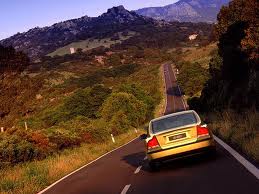A comment by John Becker, near the bottom of the page two posts ago, gave us this automotive metaphor — for steering through a thicket of addictive possibilities and staying on the road:

“…you drive defensively, paying attention. Not too tight; not too loose. You’re not so afraid of having an accident that you’re all frozen up…not so tight you can’t take in the wider picture, but not careless either, you keep your eyes on the road. You’re not alone in the car; [you’re] responsible for your family, you want to be skillful.”
That was a therapist’s response to an (ex?) addict who wished it were possible to say “never again” and be absolutely certain.
I love it. You can’t be certain you won’t have an accident, but you can drive well — flexibly, with awareness — to minimize the chances. John used this metaphor to reflect on the nature of choice. To call addiction a “disorder of choice” merely scratches the surface, he says, and I agree, because we don’t really know what choice is. We don’t know how it works, and therefore we can’t avoid the uncertainty surrounding addictive choices, present or future.
Right now I’m in this “villa” (not such a villa) in the south of France, and it’s hot, day and night. So I’ve been spending a number of hours in this semi-meditative state, rather than sleeping, which I would prefer by 2 AM. In this state I sometimes focus on my breathing, in and out, in and out, and I discover for the umpteenth time that breathing is fascinating. When you focus on your breath, you seem to be right there, present, at the moment when each breath begins. You say: ok, I’m going to inhale now, and you do. But when you relax a bit more, or when your mind wanders, you find that the breath comes anyway. Of course it does.
What’s most interesting is the place where the choice and the automatic reflex converge. There you find that the choice to begin another breath coincides with an impulse that’s already gathering. Like froth on a wave – the wave being an underlying biological rhythm that senses the world and responds to it. The breath happens on its own even when you’re doing it intentionally. So what proportion of the “decision” to inhale is actually coming from you? Or, to put it differently, how much of that inhale was actually your decision?
I think choice is like that most of the time, maybe always. Certainly the “choice” to reach for that bottle or that phone (to call your dealer) is only part choice. It’s also part impulse — the gathering and then discharging of an underlying urge or plan — mixed together with conscious volition. So your moment of intention rides like a little boat carried by a wave.
The trick then would be to work on shaping the wave – to become “skillful” in order to help protect you and your family from disaster.
Making good choices requires good habits — skillful habits. Driving habits, like addictive habits, are not built in like breathing habits. But that’s what permits us to work on them and improve them. Through effort and practice. Good habits allow the spark of choice to flair in the right direction, the way you want it to, the way that keeps you safe.
This little breathing exercise is a great way to study choice, from the inside — a start toward understanding it. But we can go further. In a couple of days I’ll post Part 2 –a look at what your brain is doing when you make a choice.
Leave a Reply to marc Cancel reply